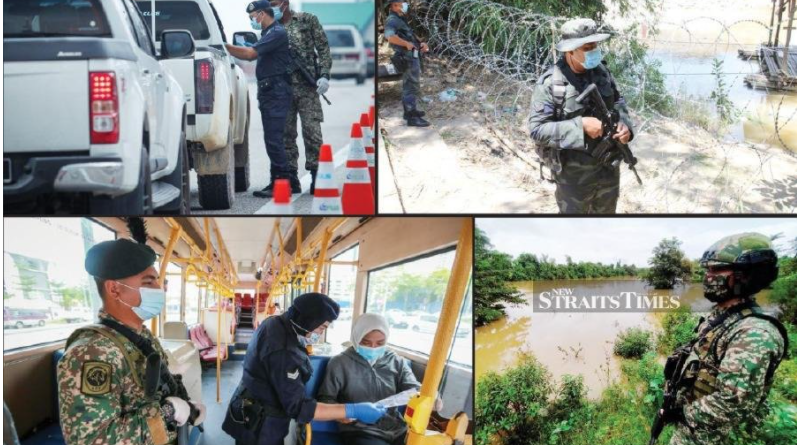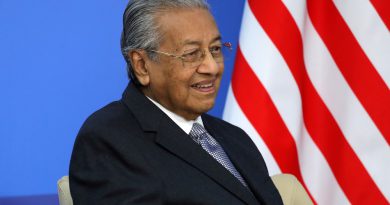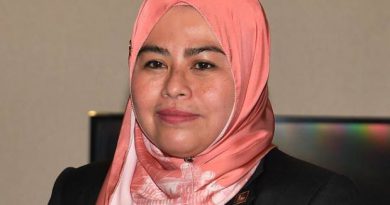Protecting the nation
KUALA LUMPUR: Just two weeks after being sworn in as the new government, Perikatan Nasional was handed the herculean task of managing the Covid-19 crisis that had just started plaguing the country.
It has been Senior Minister (Security Cluster) Datuk Seri Ismail Sabri Yaakob’s duty for the past year to appear in front of the camera and explain the standard operating procedures (SOP) of the Movement Control Order (MCO).
“On my part, we focused more on SOP compliance during the MCO, a role mainly tasked to the police and the military.
“And I can say that we have succeeded, at a time when we did not have the experience, or have a country to refer to. Not even the United States or China, because all nations were struggling with the pandemic.
“What Malaysia did last year (with the MCO 1.0) was our own model, and we successfully brought our Covid-19 numbers down.”
Ismail Sabri said this in a special interview with the media at the Defence Ministry on Monday, held in conjunction with Perikatan Nasional’s one-year anniversary in administration.
He added that the country had managed to flatten the Covid-19 curve, even achieving zero locally transmitted cases for several days in a row.”At one time during the MCO 1.0, we were the top five in the world for managing Covid-19.
“Unfortunately, after the Sabah state elections, our cases spiked and it became even worse when we allowed inter-state travel,” he added.
The government, he said, had to reintroduce the MCO, but with more flexibility to ensure a crucial balance between lives and livelihoods.
He explained that during the first MCO, the country lost RM2.6 billion per day, thus the need to reopen most economic sectors during the second MCO this year.
“People have said we ‘flip-flopped’ in our SOP, but that’s not the case. We have to adapt to the situation, and be more flexible this time around.
“We cannot continue being too rigid, or else our economy will be worse hit and our people will not be able to survive.
“We do not want the people to die because of Covid-19, but we also do not want them to starve, so we had no choice but to reopen (most economic sectors).”
Asked about his worst fears, Ismail Sabri said it was awaiting messages from Health director-general Tan Sri Dr Noor Hisham Abdullah on the daily case numbers in the country.
“That is what I fear most, because it is also my responsibility to flatten the curve. I am used to the criticisms by the public, but when I see high case numbers and deaths, I feel very worried,” he added.
Some of the criticisms, he added, were very constructive and useful, which led to changes to the MCO SOP.
Speaking on his ministry’s achievements, Ismail Sabri said the Defence Ministry’s biggest success was the ability to maintain the security and sovereignty of the country.
He said the Armed Forces continued to protect the nation’s borders well, preventing the entry of illegal immigrants and putting a stop to cross-border crimes, such as human and drug trafficking.
“One of our biggest issues is border control, and together with other agencies, such as the police, Malaysian Maritime Enforcement Agency, Malaysian Border Security Agency and others, we were able to stop the illegal entry of foreigners.”
Up to Feb 28 this year, the security forces, through Op Benteng, had arrested 12,121 illegal immigrants and 922 skippers, largely from Indonesia (5,538), Myanmar (1,571), China (922) and Bangladesh (867).
The authorities also detained illegal immigrants from Vietnam, the Philippines, Thailand, India and Pakistan, as well as Rohingya.
The Armed Forces had procured 11 units of the Rigid Hull Inflatable Boat and one multipurpose boat to maintain border security at sea.
Earlier this year, the Armed Forces also received 27 all-terrain vehicle units to intensify mobility in Op Benteng, he added.
To increase the country’s defence system, particularly through military air assets, Ismail Sabri said the use of modern technology was one of the ministry’s top priorities.
“The Armed Forces have used drones for monitoring during core operations such as Op Daulat, Op Penawar and Op Benteng, especially in monitoring the country’s borders. Drones have also been used in Op Penawar to aid in situational awareness, pattern analysis and surveillance, apart from loudspeaker operations to disseminate information,” he said, adding that the Armed Forces had 55 drones in operation nationwide.
Realising the threat of cyberattacks, the Armed Forces had formulated a surveillance and defence strategy, including the Cyber and Electromagnetic Division (BSEP), which strengthens the cyber and electromagnetic domain capabilities of the Armed Forces.
The BSEP acts as a leading agency at the Armed Forces and Defence Ministry levels in coordinating all matters related to cyber and electromagnetic domains.
“This year, we will focus on procuring more assets and upgrading our cyber defence.
“In our defence industry, my dream is that Malaysia becomes a military asset producer like neighbouring countries.
“We had successfully produced armoured vehicles and our own bullets, and built our own warships. Our aim is for the defence industry to also be able to build our own jet fighters.”
The welfare of the Armed Forces was also his ministry’s prime concern, with 223 “Rumah Keluarga Angkatan Tentera” (Armed Forces family homes) built at Semenggo Camp in Sarawak last year.
This year, the ministry plans to build an additional 1,000 homes worth RM500 million and rental acquisition planning of 364 units in Pahang, Kuala Lumpur and Sabah.
Under the “Satu Anggota Satu Rumah” (One Serviceman One House) programme, the ministry had launched the development of 3,500 units in Sungai Besi, worth between RM150,000 and RM250,000 each.
He added that the government had also approved a second housing project in Setapak, Kuala Lumpur, involving 7,374 units.
“The ministry also looks into the education of military or veterans’ children, reserving a 30 per cent quota for entry into Mara Junior Science College (MRSM) ATM-Bera.
“Their children can also enter the Royal Military College with a 20 per cent quota reserved, and 10 per cent quota for them in Universiti Pertahanan Nasional Malaysia,” he said.
Source: NST




